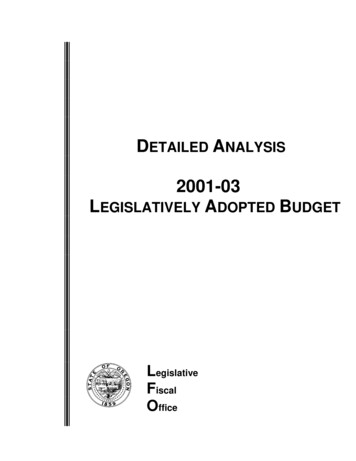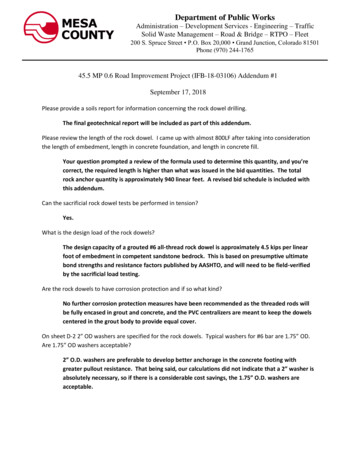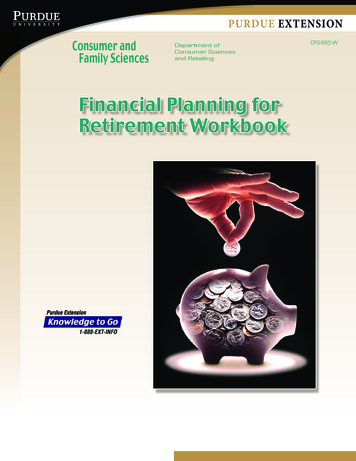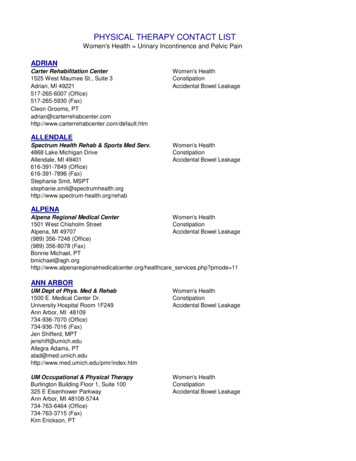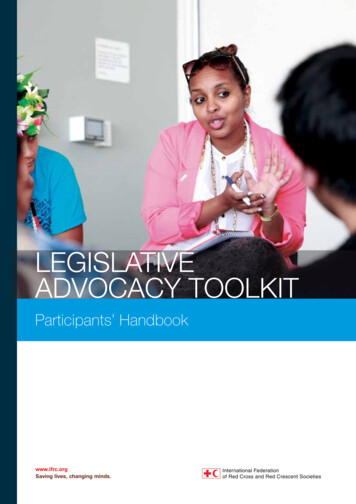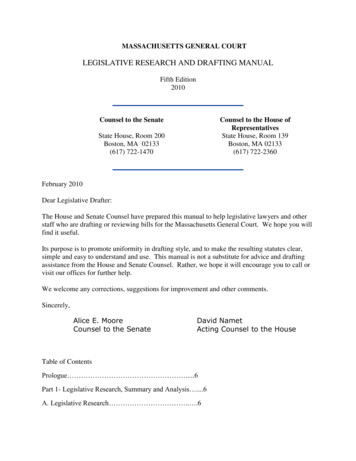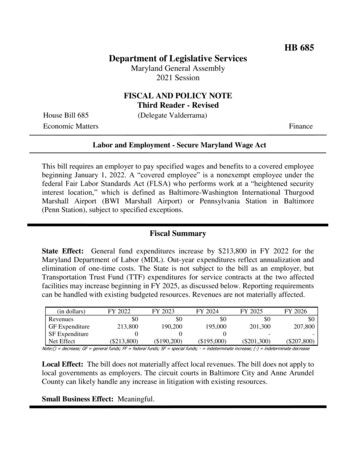
Transcription
HB 685Department of Legislative ServicesMaryland General Assembly2021 SessionFISCAL AND POLICY NOTEThird Reader - RevisedHouse Bill 685Economic Matters(Delegate Valderrama)FinanceLabor and Employment - Secure Maryland Wage ActThis bill requires an employer to pay specified wages and benefits to a covered employeebeginning January 1, 2022. A “covered employee” is a nonexempt employee under thefederal Fair Labor Standards Act (FLSA) who performs work at a “heightened securityinterest location,” which is defined as Baltimore-Washington International ThurgoodMarshall Airport (BWI Marshall Airport) or Pennsylvania Station in Baltimore(Penn Station), subject to specified exceptions.Fiscal SummaryState Effect: General fund expenditures increase by 213,800 in FY 2022 for theMaryland Department of Labor (MDL). Out-year expenditures reflect annualization andelimination of one-time costs. The State is not subject to the bill as an employer, butTransportation Trust Fund (TTF) expenditures for service contracts at the two affectedfacilities may increase beginning in FY 2025, as discussed below. Reporting requirementscan be handled with existing budgeted resources. Revenues are not materially affected.(in dollars)RevenuesGF ExpenditureSF ExpenditureNet EffectFY 2022 0213,8000( 213,800)FY 2023 0190,2000( 190,200)FY 2024 0195,0000( 195,000)FY 2025 0201,300( 201,300)FY 2026 0207,800( 207,800)Note:() decrease; GF general funds; FF federal funds; SF special funds; - indeterminate increase; (-) indeterminate decreaseLocal Effect: The bill does not materially affect local revenues. The bill does not apply tolocal governments as employers. The circuit courts in Baltimore City and Anne ArundelCounty can likely handle any increase in litigation with existing resources.Small Business Effect: Meaningful.
AnalysisBill Summary: The bill reports findings of the General Assembly and states its purposeas setting a higher wage standard for employees working at a heightened security interestlocation to promote the safety, security, and welfare of State residents.Covered EmployeesThe bill exempts covered employees from the Maryland Wage and Hour Law but does notexempt them from the Living Wage Law. The bill applies to a covered employee of anemployer only if at least 50% of the covered employee’s time during any workweek isperformed at a heightened security interest location. The bill does not diminish specifiedcollective bargaining rights or a right that is granted under FLSA.Employees covered by the bill do not include individuals employed by retailestablishments, food service facilities, or rental car agencies at heightened security interestlocations. Construction companies and airlines also are not affected.Required Minimum WagesSpecifically, an employer must pay a covered employee an hourly wage rate of at least: 13.50 for calendar 2022; 14.25 for calendar 2023; 15.00 for calendar 2024; and 16.00 for calendar 2025 and beyond.Beginning January 1, 2026, an employer must also pay a covered employee an additionalsupplement benefit rate with a value of at least 1.00 per hour, which is calculated by(1) applying the full supplement benefit to assist in covering the employee’s share of healthor other benefits, excluding paid leave; (2) applying a portion of the supplement benefit toassist in covering the employee’s share of health or other benefits, excluding paid leaveand paying the balance in cash; or (3) paying the entire supplement benefit in cash. Anemployer must pay overtime wages of at least 1.5 times the usual hourly wage requiredunder the bill for each hour over 40 hours that a covered employee works duringone workweek. An agreement between an employer and a covered employee to work forless than the wage required under the bill is void and is not a defense to an action takenunder the bill. An employer may not include a tip credit amount as part of the wage of acovered employee whose duties include providing passengers with wheelchair assistance,including a wheelchair agent or a passenger service agent. An employer of such a coveredemployee must allow the covered employee to receive tips and retain all tips received.HB 685/ Page 2
EnforcementThe Commissioner of Labor and Industry within MDL enforces the bill’s provisions asspecified and may conduct an investigation on receipt of a written complaint by anemployee. The commissioner may enter a place of employment as specified. The billspecifies how the commissioner must administer the bill. The bill includes employerposting and recordkeeping requirements. Specified records or statements that thecommissioner or an authorized representative of the commissioner obtains are confidentialand may only be shown to the commissioner or a court.A person aggrieved by a regulation adopted by the commissioner, or by an order to paywages issued by the commissioner, may file a complaint in circuit court within 60 daysafter the publication date of the regulation or order to pay wages to have it modified or setaside. The bill describes court proceedings to address the complaint.If an employer pays less than the wages required, the covered employee may bring anaction against the employer to recover (1) the difference between the wage paid to theemployee and the wage required; (2) an additional amount equal to the difference asliquidated damages; and (3) legal fees. The court must award these differences in wages,damages, and counsel fees if the court determines that an employee is entitled to recovery.However, if an employer shows to the satisfaction of the court that the employer acted ingood faith and reasonably believed that the wages paid to the employee were not less thanthe required wages, then the court must award liquidated damages of an amount less thanthe difference in wages or no liquidated damages. Upon written request, the commissionermay take an assignment of the claim in trust for the covered employee, ask theAttorney General to bring an action on behalf of the covered employee, and consolidatetwo or more claims against an employer.An employer may not pay or agree to pay less than the required wages, hinder or delay thecommissioner or an authorized representative in enforcing the bill, take adverse action asspecified in the bill, or violate any other provision of the bill. A covered employee may notmake a groundless or malicious complaint to the commissioner or authorized representativeor in bad faith bring or testify in an action or proceeding related to the bill.A person who violates provisions of the bill is guilty of a misdemeanor and on convictionis subject to a fine of up to 1,000. An employer may not be convicted unless the evidencedemonstrates that the employer had knowledge of the relevant complaint, testimony, oraction for which the prosecution for retaliation is sought.HB 685/ Page 3
Reporting RequirementsThe Port of Baltimore must compare wage rates and benefit rates of employees, byemployee category or job classification, working at the Port of Baltimore with the wagerates and benefit rates of employees working at the Norfolk International Terminals of thePort of Virginia and at the Port of Philadelphia and report its findings to the Governor andthe General Assembly by January 1, 2022.The Maryland Aviation Administration must compare wage and benefit rates for allemployees working at BWI Marshall Airport, by employee category, job classification, andemployment sector, with the wage and benefit rates for employees working atRonald Reagan Washington National Airport and Dulles International Airport and reportits findings to the Governor and the General Assembly by January 1, 2022.Current Law: For a description of Maryland’s enforcement of minimum wages, pleasesee the Appendix – Maryland Wage and Hour Law.Living WageChapter 284 of 2007 made Maryland the first state to require State service contractors topay their employees a “living wage.” For fiscal 2008, the living wage was set at 11.30 inAnne Arundel, Baltimore, Howard, Montgomery, and Prince George’s counties andBaltimore City (Tier 1). It was set at 8.50 for all other areas of the State (Tier 2). Theliving wage rates are adjusted annually for inflation by the Commissioner of Labor andIndustry within MDL. Effective September 28, 2020, the Tier 1 living wage is 14.42 andthe Tier 2 wage is 10.83. Montgomery and Prince George’s counties and Baltimore Cityhave local living wage ordinances that apply to their procurement of services.Federal Fair Labor Standards ActSimilar to State law, FLSA generally requires that workers be paid a minimum hourly wageand that overtime compensation be paid to employees who work more than 40 hours in aweek. However, Section 13(a)(1) of FLSA provides an exemption from both minimumwage and overtime pay for employees employed as bona fide executive, administrative,professional and outside sales employees. Section 13(a)(1) and Section 13(a)(17) alsoexempt certain computer employees. To qualify for exemption, employees generally mustmeet certain tests regarding their job duties and be paid on a salary basis at not less than 684 per week. Job titles do not determine exempt status.State Revenues: General fund revenues are not materially affected from any increase intax revenues or to the extent the Office of the Attorney General is awarded reasonablecounsel fees and other costs.HB 685/ Page 4
State Expenditures:Administrative CostsThe bill does not apply to the State as an employer, but it does apply to contractors andother employers that provide a variety of services at the two locations in the bill. It createsadditional responsibilities for MDL’s Division of Labor and Industry by requiringemployers to pay a specified prevailing wage to certain employees at BWI Marshall Airportand Penn Station. These changes are expected to increase the number of inquiries andcomplaints related to payment of those wages and increase field investigations related tothe anti-retaliation provisions of the bill. MDL cannot fully absorb the additional workloadwithin existing resources and requires additional staff to respond to the increase in inquiriesand complaints prompted by the bill.Thus, general fund expenditures increase for MDL by 213,782 in fiscal 2022, whichaccounts for the bill’s October 1, 2021 effective date. This estimate reflects the cost ofhiring one MDL wage and hour investigator to conduct outreach, respond to inquiries,investigate complaints, and enforce the new requirements; one civil rights officer toinvestigate anti-retaliation cases; and one half-time assistant Attorney General to handlelegal proceedings. It includes salaries, fringe benefits, one-time start-up costs (includingprogramming expenses), and ongoing operating expenses.PositionsSalaries and Fringe BenefitsOne-time Information Technology ExpenseOther Operating ExpensesTotal FY 2022 Administrative Expenditures2.5 130,44044,90038,442 213,782Future year expenditures reflect full salaries with annual increases and employee turnoverand ongoing operating expenses.Procurement CostsContractors that provide direct services to the State at the two locations (e.g., security,building maintenance, landscaping, etc.) likely pass on any increase in their labor costs tothe State. The Maryland Department of Transportation expects contract costs paid fromTTF to increase by at least 750,000 in fiscal 2022. However, the Department ofLegislative Services notes that both locations in the bill are in Tier 1 jurisdictions underthe Living Wage Act, so service contractors in those locations are already generallyrequired to pay their employees at least 14.42 per hour. That rate exceeds the ratesestablished by the bill for both calendar 2022 and 2023. Inflation adjustments throughcalendar 2024 likely bring the Tier 1 living wage rate close to the 15.00 wage rate requiredHB 685/ Page 5
by the bill for that year. Thus, any effect on State service contracts in the two affectedlocations is expected to be negligible at least through fiscal 2024. TTF expenditures may,however, increase beginning in fiscal 2025 to pay the higher wages, which exceed bothminimum wage and living wage rates in current law.Small Business Effect: Except for exempt employers under the bill, small businesses inthe State that employ low-wage workers at BWI Marshall Airport or Penn Station who arenonexempt from FLSA and who do not have direct contracts with the State experiencesignificant increases in their labor costs due to the bill that are not passed on to the State.The impact is even greater for small businesses that employ tipped employees and foremployers that pay subminimum wages or are exempt from being required to payemployees the State minimum wage under the Maryland Wage and Hour Law.Additional InformationPrior Introductions: SB 62 of 2020, a similar bill, received a hearing in the SenateFinance Committee, but no further action was taken. Its cross file, HB 1410, received ahearing in the House Economic Matters Committee, but no further action was taken.Another similar bill, SB 794 of 2019, received a hearing in the Senate Finance Committee,but no further action was taken. Another similar bill, HB 629 of 2019, received a hearingin the House Economic Matters Committee and was later withdrawn.Designated Cross File: SB 107 (Senator Hayes) - Finance.Information Source(s): Office of the Attorney General; Judiciary (Administrative Officeof the Courts); Department of Budget and Management; Department of General Services;Maryland Department of Labor; Maryland Department of Transportation; MilitaryDepartment; Department of Legislative ServicesFiscal Note History:rh/mcrFirst Reader - January 27, 2021Third Reader - April 8, 2021Revised - Amendment(s) - April 8, 2021Revised - Clarification - May 10, 2021Revised - Correction - May 10, 2021Analysis by: Michael SanelliHB 685/ Page 6Direct Inquiries to:(410) 946-5510(301) 970-5510
Appendix – Maryland Wage and Hour LawThe Maryland Wage and Hour Law is the State complement to the federal Fair LaborStandards Act, which specifies minimum wage and overtime requirements for employersand employees in the State. Chapters 10 and 11 of 2019 increase the State minimumwage rate for employers with 15 or more employees in increments until the full phase-inof 15.00 per hour on January 1, 2025. For employers with 14 or fewer employees, thewage rate reaches full phase-in on July 1, 2026.The Board of Public Works (BPW), however, may temporarily suspend one scheduledincrease in the State minimum wage for one year between October 1, 2020, andOctober 1, 2024, if it determines that the seasonally adjusted total employment is negativeas compared with the previous six-month period. If total adjusted employment is negative,BPW may also consider the recent performance of State revenues in making itsdetermination.The Acts specify that, unless the federal minimum wage is set at a higher rate, theState minimum wage for employers with 15 or more employees is as follows: 11.75 per hour as of January 1, 2021; 12.50 per hour as of January 1, 2022; 13.25 per hour as of January 1, 2023; 14.00 per hour as of January 1, 2024; and 15.00 per hour as of January 1, 2025.The State minimum wage for an employer that employs 14 or fewer employees is asfollows: 11.60 per hour as of January 1, 2021; 12.20 per hour as of January 1, 2022; 12.80 per hour as of January 1, 2023; 13.40 per hour as of January 1, 2024; 14.00 per hour as of January 1, 2025; 14.60 per hour as of January 1, 2026; and 15.00 per hour as of July 1, 2026.An employer may pay 85% of the State minimum wage rate to employees younger thanage 18.HB 685/ Page 7
The Maryland Wage and Hour Law and minimum wage requirements do not apply tocertain categories of employees, including those defined as administrative, executive, orprofessional; certain seasonal employees; part-time employees younger than age 16;salesmen and those who work on commission; an employer’s immediate family; drive-intheater employees; employees training in a special education program in a public school;employees of an establishment that sells food and drink for on-premises consumption andhas an annual gross income of 400,000 or less; employees employed by an employer whois engaged in canning, freezing, packing, or first processing of perishable or seasonal freshfruits, vegetables, poultry, or seafood; and certain farm workers.Under Maryland’s Wage and House Law, an employer is required to pay an overtime wageof at least 1.5 times the usual hourly wage for each hour over 40 hours that an employeeworks during one work week. This requirement does not apply to an employer that issubject to federal rail laws; a nonprofit concert promoter, legitimate theater, music festival,music pavilion, or theatrical show; or specified amusement or recreational establishments.It also does not apply to an employee for whom the U.S. Secretary of Transportation setsqualifications and maximum hours of service under federal law; a mechanic, parts person,or salesperson, under certain conditions; a driver employed by a taxicab operator; orspecified air carrier employees under certain conditions. Also, specific exemptions applyfor farm work, bowling establishments, and infirmaries.If an employer pays less than the wages required, the employee may bring an action againstthe employer to recover (1) the difference between the wage paid to the employee and thewage required; (2) an additional amount equal to the difference as liquidated damages; and(3) legal fees. The court must award these differences in wages, damages, and counsel feesif the court determines that an employee is entitled to recovery. However, if an employershows to the satisfaction of the court that the employer acted in good faith and reasonablybelieved that the wages paid to the employee were not less than the required wages, thenthe court must award liquidated damages of an amount less than the difference in wages orno liquidated damages.A person who violates the Maryland Wage and Hour Law is guilty of a misdemeanor andon conviction is subject to a fine of up to 1,000.HB 685/ Page 8
State Effect: General fund expenditures increase by 213,800 in FY 2022 for the Maryland Department of Labor (MDL). Out-year expenditures reflect annualization and elimination of one-time costs. The State is not subject to the bill as an employer, but Transportation Trust Fund (TTF) expenditures for service contracts at the two affected
